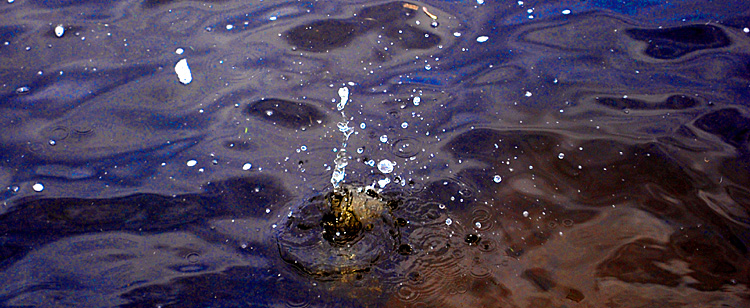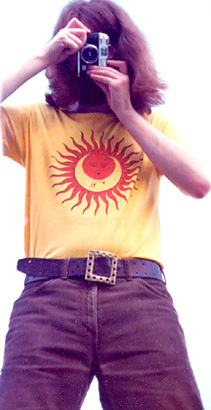
 |
list of worksPREFACEI was introduced to 'stream of consciousness' as a writing technique by my Grade 12 English Lit. teacher; not simply through readings but through practical exercises. He also awakened me to the fact that the mind, except when engaged in structured tasks, naturally expresses itself in a poetic fashion. Although I initially resisted these teachings, I soon came to accept them, perhaps because I am, as I later realized, a lateral thinker. Yet I remain uncomfortable with the term 'consciousness', for that is a state of mind in which perceptual, affective, or intuitive experiences (responses to stimuli) are subjected to various filters – analytical and censorial – in order to enhance (add value and meaning), rationalize, standardize, discriminate or differentiate, and so translate an experience into something more readily communicable at a cognitive level. Whereas writing poetry seems to me rather to be drawing on the subconscious, by disabling or bypassing such filters, with a view to converting the ineffable into the ineffaceable. My early poetry made much use of these two allied factors of streaming and lateral thinking to transmute thoughts and feelings, neither of which tend to originate verbally, into the written word. Although I settled into a more conventional poetic style, the lessons learned stayed with me, becoming an integral yet not consuming element of the poetic process: little of the verse presented here gives free rein to a 'stream of consciousness' approach, yet aspects of that style of writing are discernible in some examples of my work. I have continued, through the years, to rely on my subconscious to initiate the poetic process and, indeed, to dictate substantial parts of my first drafts, although I then usually work to give more shape to a piece or sometimes to develop subconsciously-dictated ideas into a more thematically complete product. Occasionally, when a poem comes to me in puzzle fragments, this takes the form of piecing together the parts into a coherent whole. However, rarely have I sat down with the conscious intent of writing a poem from scratch. In writing lyrics, things tend to be somewhat different: a more pragmatically gestative process. In those cases (the majority) where at least the basics of the music are formulated first, I like to let them swirl around in the mind, indefinitely, inculcating themselves within both hemispheres of the brain, until the notes of the melody start to take a fuller shape and snatches of these sounds gradually, but without overtly conscious effort, suggest themselves into vocalized words. This then becomes a starting-point for a more workmanlike drafting of lyrics, sometimes along the lines of a pre-determined theme or sentiment for the song. Yet the first phase of this process, reliant on the subconscious, might be considered akin to a stream of consciousness technique; occasionally lyrics have begun to emerge when I have been in a near-sleep state. My initial schooling in poetic technique does much to explain why the earlier poetry presented here tends to be deliberately light on formal punctuation; I considered the division of lines as an implicit, and occasionally usefully ambiguous, kind of punctuation to guide the reader, while not necessarily preventing a thought in one line running, whether directly or abstrusely, into a different thought in the next. Those same factors, along with a growing interest in etymology, help explain my taste for wordplay of various kinds, particularly ambiguity, double entendres, innuendo, seeming non-sequiturs, and deliberate use of mixed and cascading metaphors in my poetry (an interest in contiguities). Perhaps too this is my Wessex heritage finding expression, for my surname points to medieval roots in the village of Alresford, Hampshire, whence – over the course of many generations – my ancestors followed a migrational route Londonwards, through various locations in Berks, Bucks, and Oxfordshire.
At a later stage in my life I was focused more on writing lyrics for my own songs and, to an extent, melodies written by others. Poems and lyrics are quite different beasts, a failure to understand which explains why pop musicians such as Paul McCartney and Jon Anderson have been unjustly criticized for their lyrics. As the invented languages of some musicians (such as Christian Vander) show – and this is an area in which I have dabbled – the cognitive value of lyrics can be less important than their sonic qualities, although the ideal is perhaps to find a balance of both attributes, depending on the thrust of the lyric/music alliance. As a rule, texts written as poetry do not tend to make good lyrics, and lyrics – which, it must be remembered are required to communicate through a single brief hearing, rather than be read at one's own pace and potentially re-read as required – will not easily support the depth and subtleties that can be put into poetry. While of course poetry can also be a performance art, my writing is biased somewhat towards poetry received visually; I fear a heightened risk of disambiguation in poetry orally communicated. Furthermore, lyrics must try to reinforce the emotional dynamics of the music (and/or vice versa), even at the cost of sacrificing some of the cognitive integrity, or embodying repetitive elements. So I look a little more for sonic effect in my lyrics, in contrast to purportive or connotative effect in my poems. Naturally, these distinctions between poetry and lyrics are only generalizations. That said, when I returned to the writing of both poetry and lyrics – after a gap of some years in which my creative energies were focused more on career activities – I sought to write poems that were more lyrical, and infuse my lyrics with greater poetic significance (though not to the point of compromising the musical integrity). This has far less to do with improving results than it does with exploring a different region of creativity. This cross-fertilization of poetry and lyrics, again alongside my Wessex heritage, I must plead as excuse for my unfashionable taste for alliteration. I make no apology, however, for liking words. I like the way they roll around on the tongue or in the mind, generating sounds (audible or mental) somewhat like the recitative chatter of shingle-shore pebbles tumble-washed by waves. I like their age-worn smoothness, with just the occasional surprise of sharp-edgedness. I like the way they articulate when gathered into a pair of hands and rolled around together. I like the way they spread themselves out over a landscape, rugged yet coherent, and not displeasing to traverse. I like their range of colours and characters, variations on a theme, giving them individuality within the constraints of an extended family. I like that they are not imbued with a vitality of their own, but lie there waiting for us to come along and breathe life into them: arcing them into the depths, skipping them across undulating waters, pot-shotting them at passing flotsam ... never quite knowing in advance what patterns of meaning may emerge from the ripples they bring forth to interact with other environmental variables. But I get ahead of myself. |
 |
|
The majority of the poems and lyrics presented here are accompanied by one or more illustrations, mostly of my own production. I have included these either because a photograph itself or its subject was at least part of the original inspiration for a piece, or because the photo or graphic resonates (for me) with the mood/sentiment of the piece or with some aspect of its theme. For several composites I have employed photos resulting from NASA missions or taken through the Hubble Space Telescope, which, as a by-product of increasing human knowledge of the universe, astronomically, has produced some imagery of remarkable beauty and mystique; these photos have been generously placed in the public domain by NASA and the Space Telescope Science Institute (STScI). Among other sources of influence or inspiration for my creative writing, to name just a few, are Carroll, Frost, Housman, Sinfield, Breugel, and Colville. The title I have given this collection of selected examples of my poems and lyrics, "Casting pebbles into still-water" is a metaphor for writing poetry. The list of works is presented roughly in reverse chronological order of their composition, though I begin the poems with one about the experience of writing poetry, which I have always found comes easiest when the inhibitory devices of the brain (especially of the left hemisphere) are at their weakest ebb. That is, as the mind drifts off towards, or is emerging from, a state of sleep. It occurred to me, as I put my head down for a recent nap, that some might go so far as to argue that writing poetry ... creating ... imagining ... dreaming ... are all in essence metaphors to characterize techniques used by human minds – though puny, unsophisticated, and ephemeral things – to tap into or interact with the viscous flow of another dimension, the stream of a higher consciousness. That by re-fashioning or (put more plainly) tinkering with the building-blocks of language – a structural complex necessarily of limited flexibility and scope – and then casting those stones, as one might cast dice, into a still of inconceivable profundity, a wordsmith hopes to glimpse, in the resultant ripples, some distorted reflection of human existence, however small a part of the infinite. But such idle speculation would, at best, seem more pretentious than portentous. So let me conclude by saying that I have never considered myself a poet, in the sense of a true craftsman or artist with technical knowledge or skills, even though I often do a fair amount of crafting, or fine-tuning, of my original drafts. I simply write poetry, when it comes, because I must. It's not unlike defecating; it won't let me rest until I've satiated the need. But more importantly it is, of course, for the poet a voyage of discovery – exploring self, non-self, and their mutually configurative interplay – and for you, the reader, hopefully sometimes a frosted mirror. In the words of the Bard, "the eye sees not itself, but by reflection, by some other things." It should not be assumed, however, that any of my poems or lyrics are necessarily autobiographical. As Alan Bennett has noted "you don't put yourself into what you write. You find yourself there." Stephen Alsford Sandra Knudsen has created a Czech translation of this page. A Russian translation has been created by EssayHelpWriter |
| Portraits of the artist | |
|---|---|
as a young man 
|
in his fading years 
|
| Created: November 17, 2014. Last modified: August 21, 2020 | © Stephen Alsford, 2014-2020 |